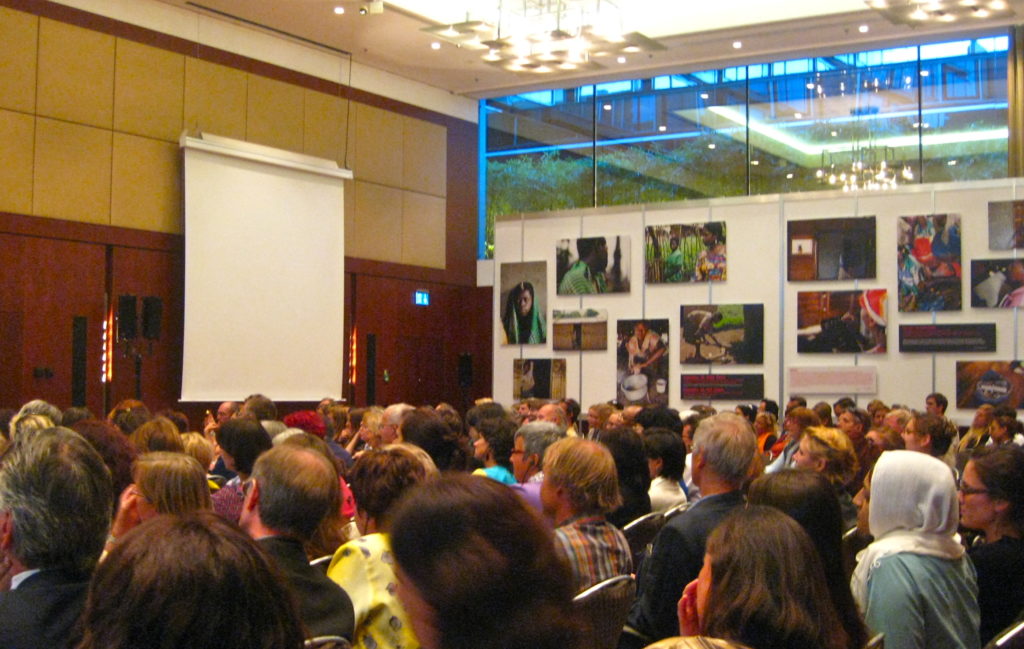
Last week I was one of around 300 people who attended the Swiss Agency for Development and Cooperation’s event on “Violence against women – an obstacle to development”. The audience was a mix of parliamentarians, interested members of the public, and activists and members of civil society organizations from the African Great Lakes region – with an (impressive?) gender balance. Speakers – including President of the Swiss Confederation, Micheline Calmy-Rey, and Navanethem (Navi) Pillay, the United Nations High Commissioner for Human Rights – discussed violence against women in an international context, as well as within Switzerland.
Mrs. Calmy-Rey noted that equality does not automatically occur as society develops, but requires the implementation of specific measures and enabling conditions to ensure that women are not seen as ‘victims’ but as a valuable part of society: UN Security Council Resolution 1325 is a step in the right direction, she stated, but we cannot afford to become complacent. She argued that “the face of poverty is the face of a woman” – with women and girls often excluded from land ownership, inheritances and education. Furthermore, she noted the damaging erosion of society as women are ejected from their social networks and communities after being raped – and stated bluntly and wonderfully that silence on this issue only helps the perpetrators: “We need to call a spade a spade, and call out the perpetrators.”
Switzerland has seemingly come a long way in this field: it is easy to overlook the fact that women in Switzerland only gained the right to vote in 1971. Only in the 1980s was domestic violence gradually no longer considered a ‘private affair’, and it was 1991 before the cantons were required to set up shelters and help those suffering such abuse. What still shocks many is that Switzerland is the only European country where prostitution by minors has not yet been criminalized, though moves are underway at the federal level for this to be changed.
Navi Pillay highlighted the feminization of human rights over the past decade, with a redesigned framework which has moved to include more of a focus on sexual exploitation, trafficking, traditional practices and discriminatory labor practices. The legal foundation is being continually strengthened – from the 1994 Inter-American Convention, to the 2003 Protocol of the African Charter, to the 2011 Council of Europe Convention. Encouragingly, there has been a shift towards it being the state’s duty to ‘prevent and protect’ where previously, communities were reliant on NGOs.
It is easy – and indeed easier – to think that serious abuse and violence against women is something that ‘happens in Africa’ and not in Europe or the Americas. As one speaker pointed out, 1 in 5 children in Europe are exposed to some form of sexual violence; in Europe, more women aged 16-44 die as a result of violence than from cancer or car accidents. Calling for this to be remembered should not however detract attention from the much-needed and incredibly heroic actions of those working to protect women in areas affected by conflict, such as women’s rights worker Justine Bihamba. Her speech last week was the most moving – and disturbing.
Active in the North Kivu region of the DRC, Justine herself was warned by Human Rights Watch to be careful as they had discovered she was on the “Wanted” list of a powerful General; her eldest child had their teeth knocked out in retribution, and her second child was violated with a knife put up her anus; her co-workers have been raped. Sadly, this passes for normality in a region where there are over 16800 (recorded) victims of rape.
The main message of the evening can be distilled into a few simple sentences:
Helping others is not easy – and talking about human rights in a state of war even more difficult. But, there needs to be an end to indifference, impunity, and the devaluation of women. Echoing Micheline Calmy-Rey: Silence on this issue means we all suffer.